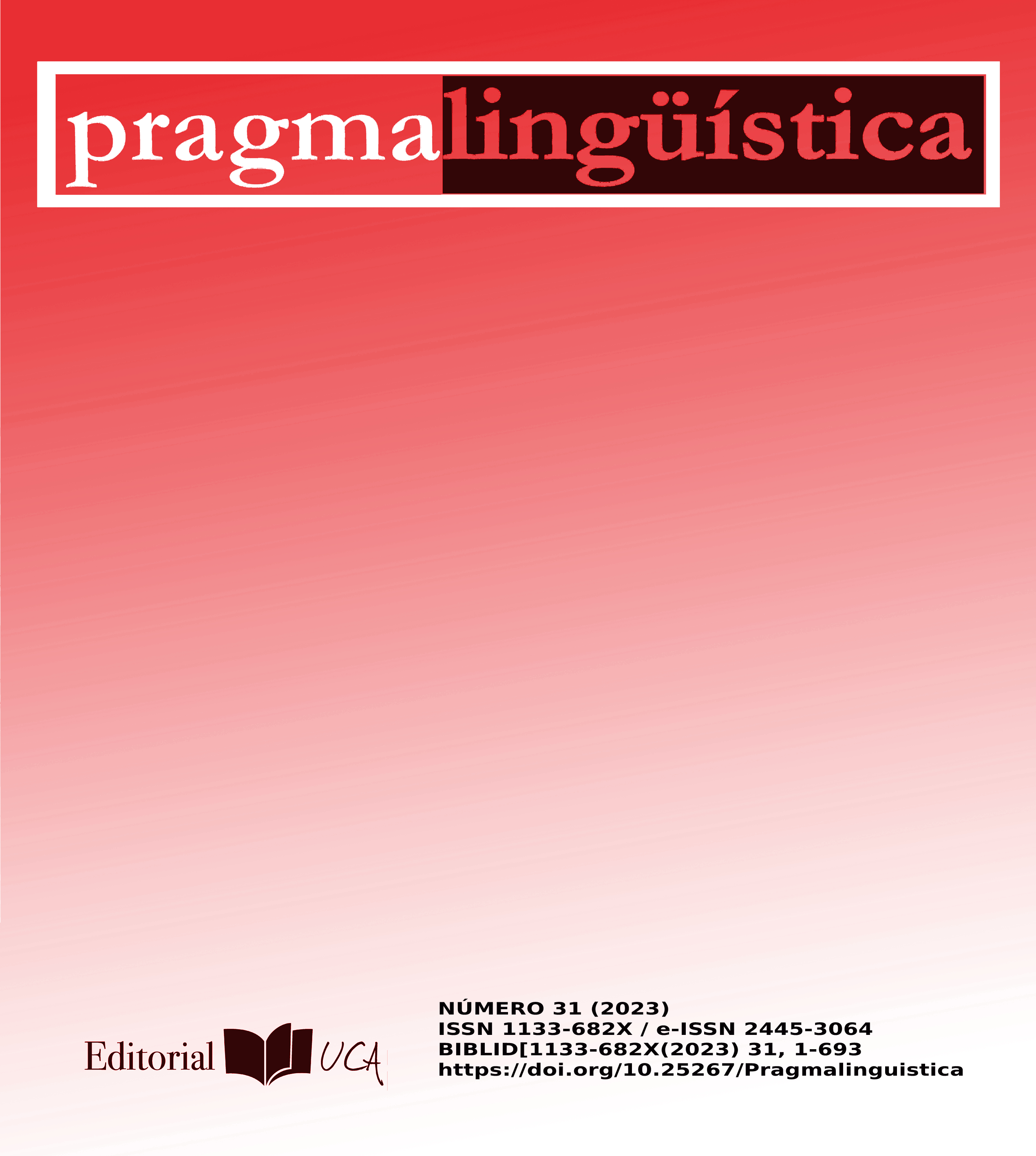Syntax-semantics mismatches in English adjectival modification
Abstract
Both positivist philosophy (Frege, 1879, 1892) and analytic philosophy (Russell, 1905, 1940; Quine, 1953, 1960) hold that the surface form of many linguistic expressions does not reveal all their meaning possibilities in an optimally transparent manner. In natural languages there exist discrepancies in composition between the syntactic structure of certain sentences and their corresponding semantic structure. It seems that the way they are composed at the level of surface form does not correspond parallelly with the way they are composed at the level of meaning (Huang, 1982; May, 1985; Sportiche, 1988). On the basis of these theoretical considerations, we undertake the present work on English adjectival modification. In this article we examine agent-oriented and mental-attitude adjectives and show that the syntactic configuration of the sentences in which they participate does not correspond biunivocally with their semantic interpretation.
Keywords
Downloads
How to Cite
License
Copyright (c) 2023 Luis Manuel Estudillo Díaz

This work is licensed under a Creative Commons Attribution-NonCommercial-NoDerivatives 4.0 International License.
References
BOLINGER, D. (1967): “Adjectives in English: Attribution and predication”, Lingua, 18, pp. 1-34.
CARLSON, G. (1977): References to Kinds in English (Ph.D. dissertation), University of Massachussetts at Amherst.
CINQUE, G. (1999): Adverbs and Functional Head. A Cross-Linguistics Perspective, New York: Oxford University Press.
COMESAÑA RINCÓN, J. (1993): “Notas a una pseudo-conversión sintáctica en inglés. Adjetivos pseudo(-in-)transitivos III”. RESLA, 9, pp. 37-48.
CRUSE, A. (2000): Meaning in Language: An Introduction to Semantics and Pragmatics, Oxford: Oxford University Press.
CULICOVER, P. (1997): Principles and Parameters: An Introduction to Syntactic Theory, New York: Oxford University Press.
CHOMSKY, N. (1986): Barriers, Cambridge, Massachussetts: MIT Press.
ESCANDELL-VIDAL, V. (2018): “Evidential commitment and feature mismatch in Spanish estar constructions”. Journal of Pragmatics. 128, pp. 102-115.
FERRIS, C. (1993). The Meaning of Syntax: A Study in the Adjectives of English, Singapore: Longman.
FREGE, G. (1879): Begriffsschrift, Halle: Verlag Louis Nebert. Traducido al inglés en J. van Heijenoort (1967): From Frege to Gödel: A Sourcebook in Mathematical Logic, 1879-1931, Cambridge, Massachussetts: Harvard University Press.
FREGE, G. (1892): “Über Sinn und Bedeutung”, Zeitschrift für Philosophie und philosophische Kritik, 100, pp. 25-50. Traducido al inglés en P. Geach and M. Black (1980): Translations from the Philosophical Writings of Gottlob Frege, Oxford: Blackwell.
GARCÍA NÚÑEZ, J. M. (1999): Semántica de los Adverbios Temo-dependientes, Cádiz: Servicio de Publicaciones de la Universidad de Cádiz.
GRICE, H. P. (1975): “Logic and Conversation”, Cole, P. y Morgan, R. (eds.), Syntax and Semantics 3: Speech Acts, New York: Academic Press, pp. 41-58.
HORNSTEIN, N. (1995): Logical Form: From GB to Minimalism, Cambridge, Massachussetts: MIT Press.
HUANG, J. (1982): “Move WH in a Language without Wh-Movement”, The Linguistic Review, 1, pp. 269-416.
JACKENDOFF, R. (1972): Semantic Interpretation in Generative Grammar, Cambridge, Massachussetts: MIT Press.
JACKENDOFF, R. (2010): Meaning and the Lexicon: The Parallel Architecture 1975-2010. Oxford; Oxford University Press.
KRATZER, A. (1995): “Stage-Level and Individual-Level Predicates”, Carlson, G. y Pelletier, F. J. (eds.), The Generic Book, Chicago: University of Chicago Press, pp. 125-175.
LARSON, R. K. (2000): “ACD in AP?”. Paper presented at the 19th West Coast Conference of Formal Linguistics (WCCFL 19). Los Angeles, CA.
LEES, R.B. (1960): “A multiply ambiguous adjectival construction in English”, Language, 36, pp. 207-221.
MAY, R. (1985): Logical Form: Its Structure and Derivation, Cambridge, Massachussetts: MIT Press.
OJEA LÓPEZ, A. (1998): “On the Eventive Structure of Adjectives and Adverbs”, Atlantis, 20, pp. 159-177.
PUSTEJOVSKY, J. (1995): The Generative Lexicon, Cambridge, Massachussetts: MIT Press.
QUINE, W. V. (1953): From Logical Point of View, Cambridge, Massachussetts: Harvard University Press.
QUINE, W. V. (1960): Word and Object, Cambridge, Massachussetts: MIT Press.
QUIRK, R., S. GREENBAUM, G. LEECH & SVARTVIK, J. (1985): “Complements of verbs and adjectives”, A Comprehensive Grammar of the English Language. London: Longman, pp. 1147-1223.
RADFORD, A. (1988): Transformational Grammar, Cambridge: Cambridge University Press.
RAPOPORT, T. R. (1991): “Adjunct-Predicate Licensing and D-Structure”, Rothstein, S. (ed.), Syntax and Semantics, 25: Perspectives on Phrase Structure: Heads and Licensing, New York: Academic Press, pp. 159-187.
ROBERTS, I. (1987): The Representation of Implicit and Dethematized Subjects, Foris: Dordrecht.
RUSSELL, B. (1905): “On Denoting”, Mind, 14, pp. 479-493.
RUSSELL, B. (1940): An Inquiry into Meaning and Truth, London: Allen and Unwin.
SAG, I. (1976): Deletion and Logical Form (Ph.D. dissertation), Cambridge, Massachussetts: MIT Press.
SHAER, B. (2000): “Syntactic Positions and the Readings of ‘Manner’ Adverbs”, Fabricius-Hansen, C., Lang, E. y Maienborn, C. (eds.), Approaching the Grammar of Adjuncts. ZAS Papers in Linguistics, 17, pp. 265-287.
SPERBER, D y WILSON, D. (1986): Relevance: Communication and Cognition, Oxford: Blackwell.
SPORTICHE, D. (1988): “A Theory of Floating Quantifiers and its Corollaries for Constituent Structure”, Lingustic Inquiry, 19, pp. 425-449.
TRAVIS, L. (1988): “The Syntax of Adverbs”, McGill Working Papers in Linguistics. Special Issue on Comparative Germanic Syntax, Montreal: McGill University, pp. 280-310.
WYNER, A. (1994): Boolean Event Lattices and Thematic Roles in the Syntax and Semantics of Adverbial Modification (Ph.D. dissertation), Ithaca, New York: Cornell University.
ZUBIZARRETA, M. L. (1982): Levels of Representation in the Lexicon and in the Syntax, Foris: Dordrecht.







